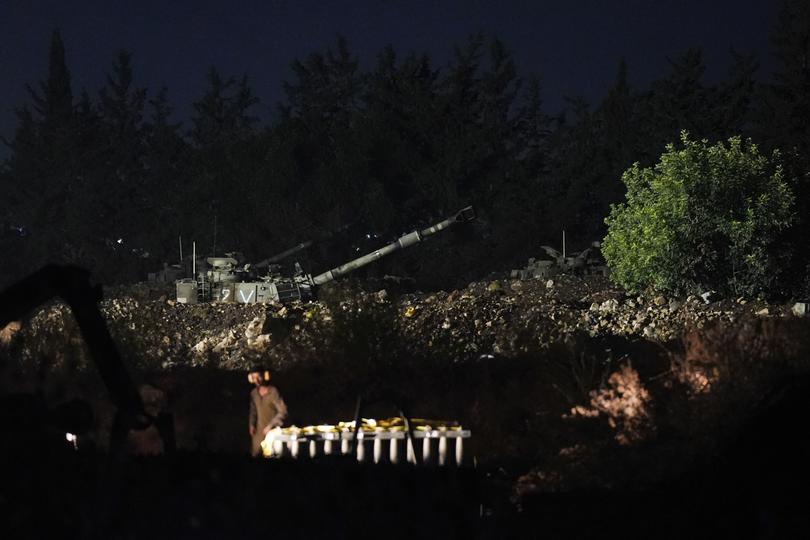Lebanon: Israel approves ground invasion, warns US it will commence ‘within hours’, as Beirut blasted
The Israeli Government has reportedly approved ground troops to enter Lebanon, with officials telling the US that it will cross the border ‘within hours’ as people in Beirut are warned to evacuate.
The Israeli Government has approved ground troops to commence an invasion of Lebanon, with officials telling the US that it will cross the border “within hours” as blasts in Beirut are heard after the the IDF to “evacuate immediately”.
Speaking on Sky News UK, Lebanese Economy Minister Amin Salam confirmed that Israel’s “operations have started”.
“In the last few minutes we got news that the Israeli government has given full approval for escalation,”
Sign up to The Nightly's newsletters.
Get the first look at the digital newspaper, curated daily stories and breaking headlines delivered to your inbox.
By continuing you agree to our Terms and Privacy Policy.Israeli special forces have commenced raids through Lebanon, including Hezbollah tunnels, in an attempt to quash the terrorist group’s ability to fight back.
Israeli Defence Minister Yoav Gallant told local council heads in northern Israel that the next phase of the war along Lebanon’s southern border would begin soon, and support the aim of bringing home Israelis who have fled Hezbollah rockets during nearly a year of border warfare.
He also told troops: “We will use all the means that may be required - your forces, other forces, from the air, from the sea, and on land. Good luck.”

Blasts heard in Beirut after ‘evacuate’ warning issued
About an hour after the grim warning was issued, reporters near the areas of concern have confirmed loud blasts have been heard.
The Arab spokesperson for the IDF, Colonel Avichay Adraee warned people in multiple areas of Beirut to “evacuate”.
“For your safety and the safety of your family members, you must evacuate the buildings immediately and start from a distance of no less than 500 meters,” Mr Adraee said.
“You are present near interests and facilities affiliated with the terrorist Hezbollah and therefore the IDF will act against them forcefully.”
At least three separate blasts have been reported, with the explosions shaking the city and filling the air with deafening noise.
Amal Al-Hourani, mayor of Jdeidet Marjayoun, a Christian-majority Lebanese village less than 10km from the border, told Reuters that some locals had received calls apparently from the Israeli army telling them to evacuate the area as soon as possible.
US told about the Israeli invasion
Friday’s assassination of Hassan Nasrallah - the most powerful leader in Tehran’s “Axis of Resistance” against Israeli and U.S. interests in the Middle East - was one of the heaviest blows in decades to both Hezbollah and Iran.
A US official, who spoke on condition of anonymity, told Reuters the positioning of Israeli troops suggested a ground incursion could be ‘within hours’.
The Washington Post cited an unidentified US official as saying Israel had already told the US the operation would be smaller than its 2006 war against Hezbollah and focus on border security.
Asked about the reports, US President Joe Biden, who has so far had little success urging Israel to rein in its assaults on Hezbollah or on the Hamas militia in Gaza, called for a ceasefire.
“I’m comfortable with them stopping,” he told reporters.
Hezbollah ‘ready for a ground engagement’
Hezbollah’s deputy leader Naim Qassem, in a first public speech since Israeli air strikes killed Nasrallah, said that “the resistance forces are ready for a ground engagement”.
As he spoke, Israeli air strikes in Beirut and elsewhere in Lebanon continued, extending a campaign that has eliminated several Hezbollah commanders but also killed about 1000 civilians and forced one million to flee their homes, according to the Lebanese government.
The death toll from an Israeli strike on the southern Lebanese town of Ain Deleb rose to 45, Lebanon’s health ministry said on Monday.
Nasrallah’s killing, along with the assassinations and systematic attacks on the group’s communications devices, constitute the biggest blow to the Shi’ite movement since Iran created it in 1982 to fight Israel.
Nasrallah built Hezbollah into Lebanon’s most powerful military and political force, with a wide reach across the Middle East.
Now it must replace a charismatic, towering leader who the West branded a terrorist mastermind but who to millions of supporters was a hero who stood up to Israel.
Qassem said it would “choose a secretary-general for the party at the earliest opportunity”.
He said Hezbollah had continued to fire rockets as deep as 150km into Israeli territory.
“We know that the battle may be long,” he said.
“We will win as we won in the liberation of 2006,” he added, referring to the last big conflict between the two foes.
But Israeli Prime Minister Benjamin Netanyahu warned Hezbollah’s main backer, Iran, that “there is nowhere we will not go to protect our people and protect our country”.
In a three-minute video clip in English that he addressed to the Iranian people, he accused their government of plunging the Middle East “deeper into war” at the expense of its own people, whom it was bringing “closer to the abyss”.
- With Reuters
